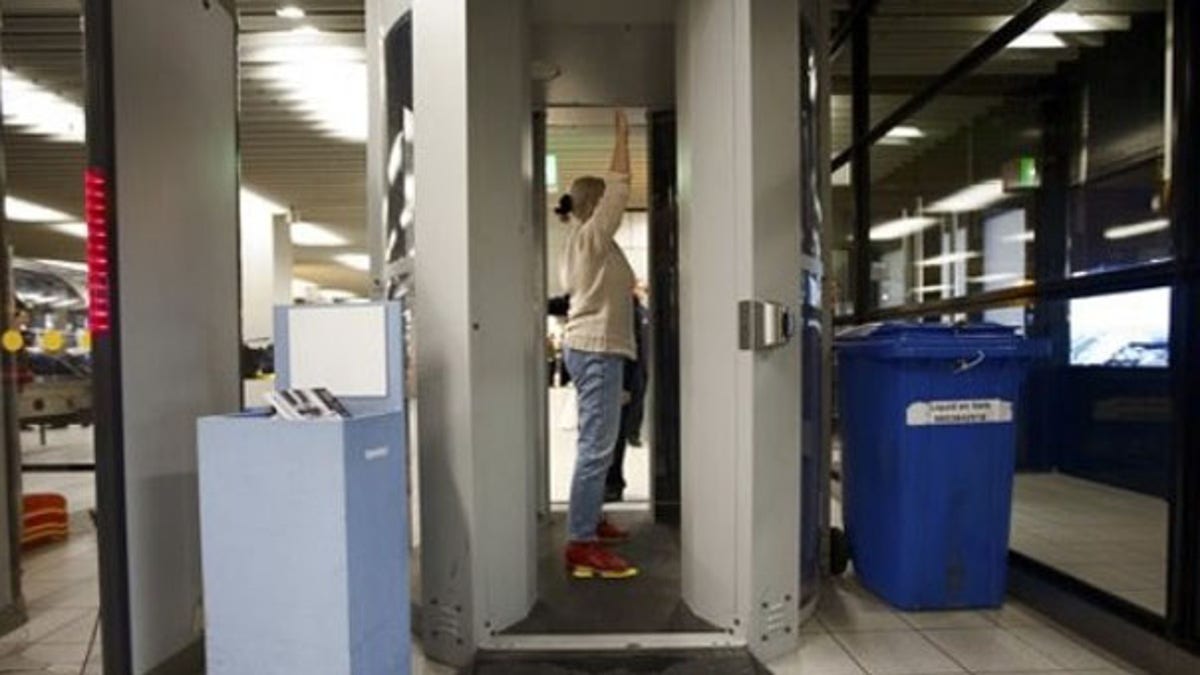
A passenger is screened inside a body scanner at Schiphol airport, Netherlands, Dec. 28. (AP Photo)
The Department of Homeland Security could be severely hampered in its effort to enforce any new airline security restrictions by an obvious fact: its authority ends at the nation's borders.
Umar Farouk Abdulmutallab, the 23-year-old Nigerian accused of trying to blow up a Northwest Airlines flight as it approached Detroit on Christmas, boarded the plane in Amsterdam, Netherlands. Terror analysts and officials say Amsterdam is one of the most secure airports in the world and that the United States requires all passengers to be screened before boarding any airplane flying directly to the U.S.
But the United States does not have absolute authority to enforce its standards. And if the Obama administration, which has opened a review of airline security in the wake of the attempted attack, goes too far in ordering across-the-board changes, it could run into resistance and roadblocks across the globe.
Analysts say it would take U.S. training, money and persistence to ensure any new changes are implemented properly overseas. And they cautioned that the countries that pose the greatest security risks will have the hardest time upgrading.
Kip Hawley, former administrator for the Transportation Security Administration, said that while all countries are supposed to comply with TSA standards before a flight departs for the United States, those nations outside of Europe and the United States will require the most attention should there be any security upgrades.
"The issue is the broad spectrum of the world," Hawley said, adding that the TSA could increase trainers dispatched to other countries, such as nations in Africa.
Around the world, airports operate under basic security procedures outlined by the United Nations' International Civil Aviation Organization. The United States goes further in requiring its own standards be implemented for inbound flights, but the United States does not have absolute authority to enforce those standards. Hawley said the U.S. orders individual airlines to abide by TSA regulations, and if a host country resists, then the U.S. can threaten to cut off direct flights to and from that country.
"That's the big hammer," Hawley said.
But Jim Walsh, an international security analyst at the Massachusetts Institute of Technology, said that "hammer" might not be that big of a deterrent, particularly for countries that don't have many direct flights to the United States.
"At the end of the day, they're all sovereign countries," he said.
Walsh said the United States will probably have to provide aid to convince the "weak links" to get up to snuff. And he urged the administration not to set expectations too high.
"Mostly the people who are non-compliant are going to be in the developing world ... It's the Nigerias of the world," he said. "I wouldn't expect a sea change in the way international airports handle their passengers. The poorer the country, the less likely it is they're going to meet European or U.S. standards. This is about improvement at the margins."
Hawley said that regardless of how much aid or training is directed overseas, a persistent challenge will be ensuring those nations stay vigilant after the current period of acute alertness has passed.
"Maintaining the vigilance and the professionalism and integrity of the searching process on a day-to-day basis ... that is a very significant challenge," Hawley said.
The Obama administration has ordered a review of two key areas: the compilation of terror watch lists and detection capabilities at airports.
The suspect in the Detroit case, Umar Farouk Abdulmutallab, was on a watch list of 550,000 people with known or suspected ties to terrorism. However, he did not make it to the much smaller "no-fly" list or even a list a "selectees" who would be pulled out of line for secondary screening at any airport.
Lawmakers say a secondary screening would have likely resulted in the suspect being caught before he boarded. Officials said he carried the explosive PETN on to the flight and possibly another substance, though the mixture ultimately failed to detonate in a large explosion.
Analysts say "puffer" machines could have also detected the powder, as could bomb-sniffing dogs. A Dutch newspaper reported that the Amsterdam airport was not using a new kind of scanner in its possession that could have detected the powder as well.
But terror analysts caution that such security measures cannot be implemented across the board, or else airports will grind to a halt.
"There's never going to be a universal answer to this," said the Heritage Foundation's James Carafano. "You can throw all the technology you want at this. It's very expensive. It's really like looking for a needle in a haystack. The key is to keep the terrorist off the plane. And that means you have to go after them."





















